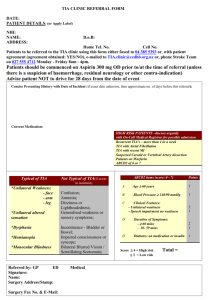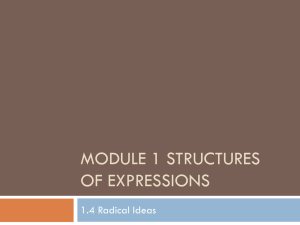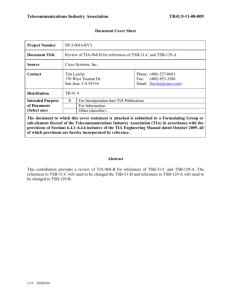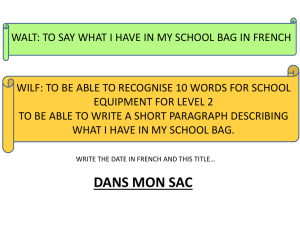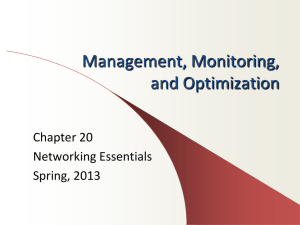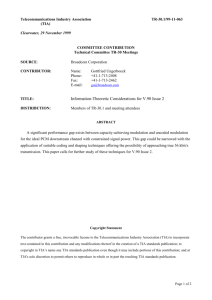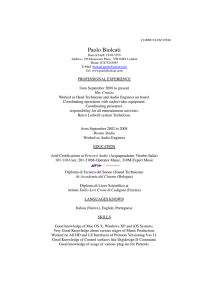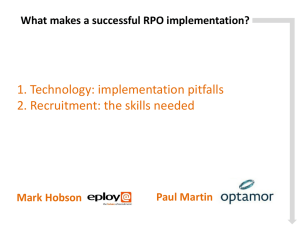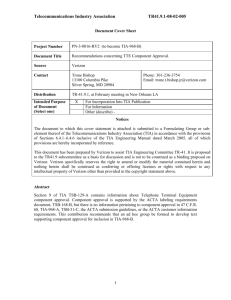Computer Based Assessment System-Reading (CBAS-R)
advertisement
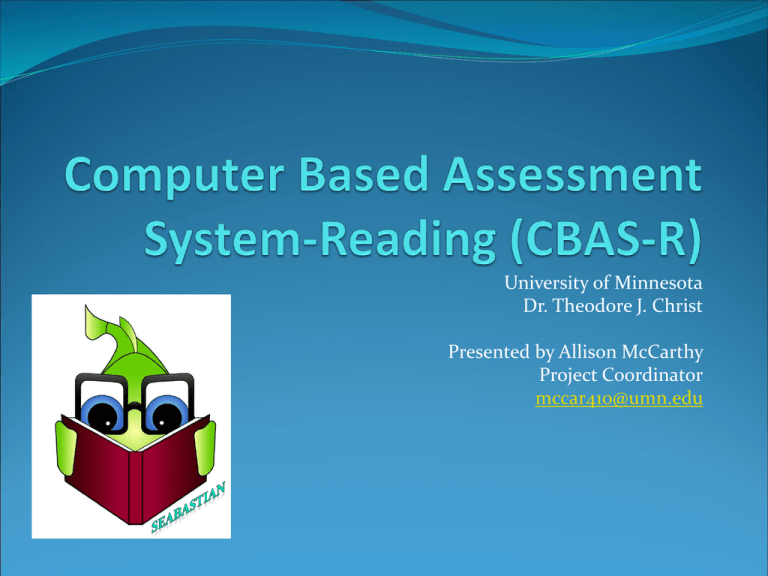
University of Minnesota Dr. Theodore J. Christ Presented by Allison McCarthy Project Coordinator mccar410@umn.edu What is CBAS-R? A research project at the U of M funded by the USDE. We focus on 5 domains of reading. A free, online, computer adaptive test. What have we done? Conducted research in 6 school districts: Field tested close to 1000 items; Administered CBAS-R as a screening tool in three schools. Instructionally Relevant Model National Reading Panel’s Instructional Targets (2000) Who does CBAS-R serve? Students who teachers might consider at risk for reading difficulties; are receiving supplemental services; have an IEP. Where is CBAS-R now? A second round of item development and item evaluation occurred during the 2009-2010 school year: 3 School Districts; Grades K through 5. CBAS-R can be group or individually administered. CBAS-R is a Computer Adaptive Test (CAT). Computer Adaptive Test Algorithm 1. Begin with provisional early reading “ability” estimate 2. Select and display optimal test item 3. Observe and evaluate response No 5. Is stopping rule satisfied? 4. Revise ability estimate Yes 6. End Test 7. End of Battery? Yes 9. Stop No 8. Adm. next test Where is CBAS-R going? Each of these are or will be utilized within a CAT platform. Screening tool: To be used 3 to 4 times a school year. Current data collections will explore this utility (2010-2011 academic year). Progress Monitoring tool: To be used on a weekly or semi-weekly basis. Skills Analysis: To identify instructional targets based on the National Reading Panel’s “Big 5”. We will continue to work toward identifying specific subskills within each domain, in order to match students’ instructional target. Why participate in CBAS-R research? To receive money to go toward your school library. To help us with research to benefit children. Students engage in reading activities. Teacher Acceptability Ratings Conducted in the classroom, by teachers. Strongly disagree Disagree Slightly disagree Slightly Strongly agree Agree agree It was intrusive to the rest of the 84% 16% class. Scheduling was easy. 33% 67% Students were motivated to 16% 84% participate It caused problems for 84% 8% 8% individual students Student sessions were brief 33% 67% Running the program was 75% 25% difficulty The classroom location was 8% 16% 75% beneficial Note. Data are from 12 teachers of first and second grade classrooms participating in an 8-week pilot study of an in-class progress monitoring application of a preliminary version of CBAS-R. CBAS-R Set-up in the Schools We bring the data collectors and our 28 laptop mobile computer lab. We use an online database to access the test administrations. Students listen to item instructions through headphones that we provide. CBAS-R as a Screening Tool 6-10 minutes per student. Computer adaptive test that precisely and efficiently identifies the student’s skill level. Assesses students on a continuous metric from Kindergarten through 5th grade. This allows us to demonstrate a student’s skill level relative to other grades (E.g., a fifth grade student who performs at a level similar to that of a second grade student). Measures of Academic Progress (MAP) or curriculum-based measures (CBM) cannot provide the same level of comparison. Likely st 1 Grade Items Audio: What word do these sounds make? /p/i/g/. Click on the picture of the /p/i/g/. Audio: Click on the word “can.” a. can b. cat c. cup d. call Likely rd 3 Grade Items Audio: Choose the best answer to finish the sentence. I had already _____ my letter, but forgot it at home. a. b. c. d. age fold wrote written Audio: Choose the best answer. I needed to pack all of my gear for a camping trip. I needed to fit the tent, sleeping bag and food into one bag because there wouldn’t be many people to carry many bags. I looked in the closet at all the bags we had: a large duffle bag with many pockets, a backpack with many pockets, my mom’s old purse, or a green suitcase. Which type of bag should I use? a. b. c. d. The backpack The duffle bag The purse The suitcase Likely th 5 Grade Item Audio: Choose the best answer. Tia laboriously treaded through the thick undergrowth in the forest. As beads of sweat budded on her forehead, she felt despair growing from the pit of her stomach. She was unable to think clearly even as she tried to take deep, calming breaths. Her mind was abuzz with the possible torment that lied ahead. What is the author’s purpose in this passage? a. To demonstrate that Tia is in danger. b. To demonstrate that Tia is unable to think. c. To demonstrate that Tia might be traveling after dark. d. To demonstrate that Tia is afraid of forests. Presented by Allison McCarthy E-mail: mccar410@umn.edu

